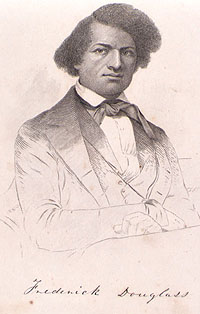
Douglass in 1845
Douglass' Paper was specifically dedicated to the related causes of abolishing slavery and improving the condition of "free colored people in the North." It also featured stories and editorials on a wide range of liberal reform topics, from temperance to woman's rights. It paid some attention to local events in and around Rochester, but its real focus, like its readership, was national, or at least Northern. Given Douglass' rhetorical situation, he gave a surprising amount of room in his columns to the other side, often reprinting Southern or pro-slavery items with little editorial comment. No reader, however, could have missed the paper's own commitment to attacking instances of injustice or oppression on both sides of the Mason-Dixon Line.